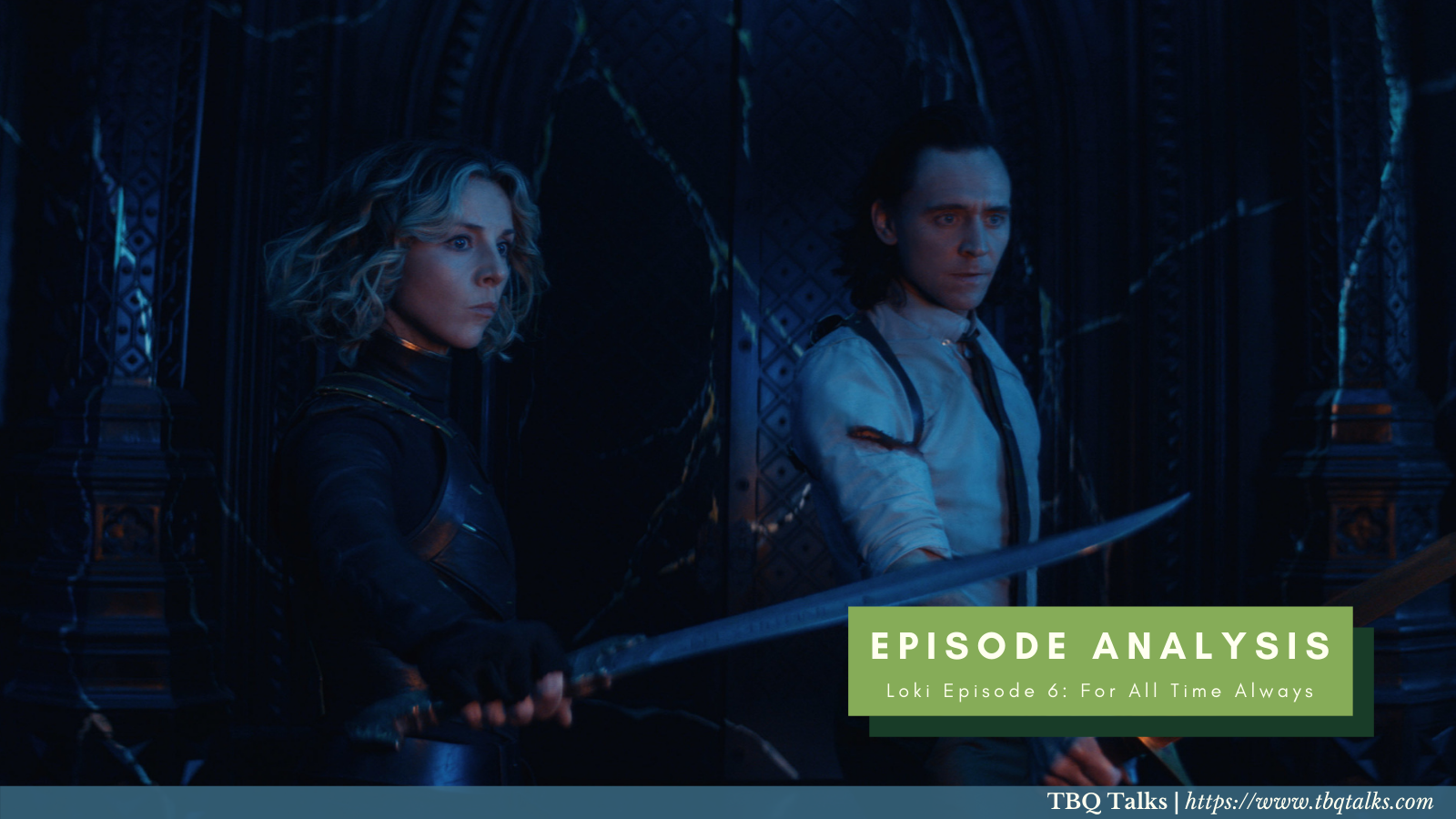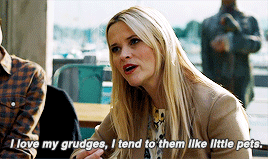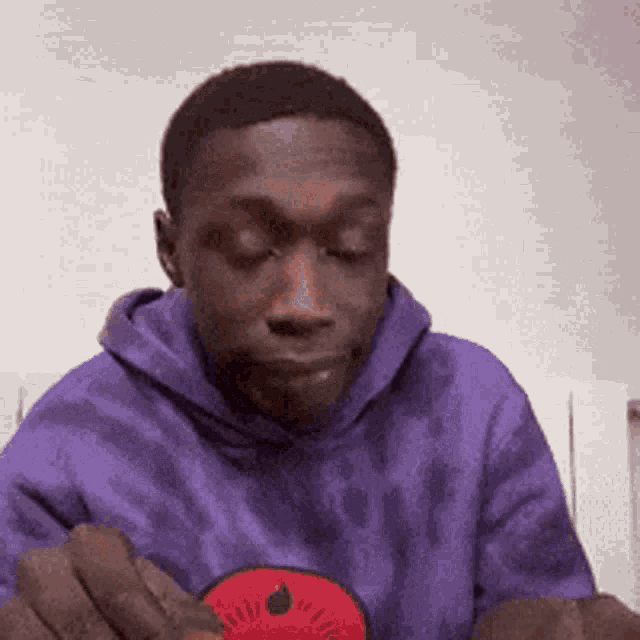Loki Episode 6 Analysis: For All Time Always
How did Loki episode 6 do as an episode and as a finale to the first season? Is it a must watch or a not so much?

Warning: Here there be spoilers for the entirety of the MCU and all six episodes of Loki season one. Proceed at your own risk.
Intro
I'm going to be honest, I have no idea what I think of this ep.
Well I'm me so I have lots of things I think about this ep. I don't call this place "TBQ Talks" out of a sense of irony based in being renowned for my stoicism. But if you asked me to boil it down to a single answer to "Was it good?" I got nothing.
I know, I know. There are people absolutely creaming themselves over the finale. Best show ever! MCU blown wide open! And let me be clear right off the bat: If this is you I am happy for you. In fact I'm going to suggest that if that was your opinion this article isn't going to be for you. Because I'm going to talk about how the show actually did not do any of that. I'm not trying to do this to harsh anyone's squee but because the whole thing of these articles is that I talk about how the shows do what they do and if they actually accomplished doing it.
So yeah, if you don't want a "Huh, Thanos really does stand there and wait politely for a long ass time while everybody comes out of the portals" type pin in your Loki series balloon go on! You have my encouragement and blessing not to read this. No harm, no foul, I'll see you in the next article.
But if you want my thoughts and the whole here's what did and didn't work breakdown as per usual, hey nice to see you. Get comfy. We have tea brewing on the table over there.
Because it's a season finale I'm going to break this down into two parts: Did it work as an episode and did it work as a series.
Short answer: Mostly yes and... uhhhh, eh? In that order.
Longer answers to follow.
Oh - and I know the show never used the name (more on that in a bit) but I'm just going to say Kang because it's shorter.
Did Loki Episode 6 Work As An Episode?
I think it did. For the most part I thought this was a solid episode. First and foremost because Jonathan Majors was in it and that's always going to up the quality of a show even if his only appearance is to accidentally walk into frame while on his way to the I Was In Lovecraft Country And All I Got Was This Well Fitted T-Shirt About The Show's Flawed Handling Of Intersectionality support group.

It's even better that Jonathan wasn't a blink and you'll miss it cameo but someone given the master level task of being solely responsible for what feels like 2/3 of the script which was nothing but exposition. Yes, the show added in little visuals - and I did like the figurine puppet show - but while Jonathan was acting that out all he had was himself, a cheap looking costume, and some props on a desk. He turned that into something interesting without making it either Evil Villain Monologue 101 or Never Go Full Lex Luthor In the DCEU fake quirky. Loved it.
I also loved how Loki and Sylvie, for the most part, felt competent and like characters with clear motivations. Yes, this is shade on previous episodes but you've presumably already read those reviews of mine so that's not news.
But things like having Loki and Sylvie, gods of lies, pointing out that they had no reason to trust what they were being told was good! Loki being able to spot the flaws in the whole "I'll step down and let you take over" suggestion was good! Sylvie, who knows all about implanting false memories, knowing that Kang giving her a fake happy childhood would be useless was good!
I liked that Loki was confident and fairly competent. This felt much more like the character who tried to take over Earth in what in-universe was six freaking episodes ago. There was no sign of the Loki who would accidentally swallow his tongue in a battle rather than know how to use his own magic.
There were also good callbacks to things that motivate the characters: Loki of course would be tempted by the idea that the right person in charge could and should be thanked for removing free will, while Sylvie of course would rebel against that very suggestion.
I also liked some of the directing and cinematography choices. Sylvie was allowed to show her anger in that slow mo shot of her going to kill Kang instead of having to keep a pretty face. I loved how during the debate with Loki and Sylvie they kept Kang in the background and framed Loki's shots so you could see Kang listening in.
On top of that, I loved the consistency of the symbolism. Loki, who has grown more comfortable with himself as the series goes on, is ready to make a passionate showing of his love for Sylvie. Sylvie, who still struggles with self-acceptance, isn't really into returning the gesture. As I've said, psychological metaphors are my jam! This was great, as far as I'm concerned.
As you may guess from the stuff I'm focusing on, I was not as thrilled by the stuff happening at the TVA but those issues get into how the series works as a whole so I'll talk about that in a sec.
In general if people asked me if there's anything in Loki worth watching I would probably point to this ep. That is 100% because of the work that Jonathan does, which elevates the material to the point where it's worth watching him make the script his own even if you have no idea what the hell he's talking about.
But this does raise the next question of whether or not you need to have seen the previous five episodes in order to understand this one. And my answer to that is no, not really. And that goes to the series as a whole.
Does Loki Work As A Series?
We're three shows into the MCU Disney+ experiment and I feel it's thus safe to say that we know the role these shows are meant to play: They are stand alone stories which add depth to things which will show up in the movies but are in no way required viewing. Thus the thing to judge them on is whether they provide a good use of our time for the length of however many episodes they have.
I know that IMMEDIATELY there are people who don't even read this website whose "Um, ACTUALLY..." senses are tingling and they are racing over here to try to spontaneously generate a comment section in order to tell me how wrong I am. And this is the part where again: if you love these shows and adore thinking of how they are a key part of the MCU please by all means keep enjoying that and feel free to go watch your favorite YouTube videos or something instead of finishing this article. I'm totally okay with this.
On the other hand if you want to get into the discussion - or, well, my thoughts since again there is no comment section because my own life is far too short - let's do it.
First up, I want to say that the self-contained nature of the shows is not something I think is a bad thing. Like I said, it just means that the success or failure of the shows is based in whether or not they tell us a good story within their little bubble. This is no different than saying we judge a comedy by how funny it is.
But what it does mean is that the quality of the show cannot hinge on "OMG MCU BLOWN WIDE OPEN!!!!!!!! NOTHING IS THE SAME!!!!!!!" because none of the shows thus far have done anything which meets that criteria.
Yes, even Loki.
"But multiverse! Kang!" the "um, ACTUALLY" crowd will say. "Kevin Feige is a genius because this show is KEY to No Way Home and Multiverse of Madness and Quantumania and - "
To which I reply:
"Peter? Hi, it's Doctor Strange. I'm calling to tell you that the multiverse exists and this is a problem because there's an evil being who is going to take advantage of that to try to destroy us all."

Seriously, did I miss anything? For the sake of argument let's assume every rumor, hope, and wet dream about the plot of No Way Home is true: It's got all the Spideys up to and including Miles and Peter Porker in cartoon form. It's got the entire cast of every Netflix Marvel show. It brings Tony Stark back from the dead to fight Doctor Doom while Wolverine and Deadpool help and Kang takes a grownup Laura Kinney out for a latte in the background. What in Loki is required to tell this story which wasn't covered by that single line of dialogue?
Is it nice information? Is the backstory on Kang which Jonathan acts the shit out of interesting? Heck yeah. I just spent a whole section of this article talking about how great it was and how it's an episode of television worth watching. But it's not required which is the key difference.
Remember the movies are what make the most money. What is most likely: That the Disney+ shows, which aren't even available in every country, are mandatory viewing to the point that audience members the world over run the risk of thinking they wasted the cash they spent on a babysitter, parking, movie tickets, and popcorn which costs more than the down payment on a reasonably priced SUV to see a film that made no sense to them or that the Disney+ shows are nice to haves which might add some layers if you watched them but don't hurt anything if you haven't?
Yeah.
Which again isn't a bad thing! I'll cheerfully use The Falcon and the Winter Soldier as my example here because to date it's my favorite of the aired Disney+ shows and it is still in no way required viewing for any of the MCU movies up to and including Captain America 4. Why? Because in Endgame Sam takes the shield and at the end of FAWS Sam takes the shield. FAWS had to even teach us why the universal "Oh cool, Sam is Captain America now" assumption from Endgame was wrong and was actually "Sam will be Captain America, but at the end of episode 5."
Now in the meanwhile FAWS gave us a good story! Not about the Flag Smashers, of course, that's totally a lost cause. But in terms of adding to our depth and understanding of the title characters as well as providing history and layers to the concept of Captain America and race in the MCU. It was great stuff! Not required but also not a waste of six hours of the audience's time. It was, in its little bubble, a pretty good story.
(Again if we ignore the Flag Smashers, but I'll get to that dynamic in a sec.)
Same for WandaVision which y'all know I had problems with. But a problem I didn't have was in how the show added depth to our understanding of the title characters. We finally got an explanation for why Wanda and Vision were in a relationship other than "Because it's in the comics and since Tony Stark was involved with the design it's assumed that Vision has a vibrate feature." We got to see Wanda's life, and who she is as a person other than somebody who does interpretive dance during battles. I came into WandaVision assuming it was going to be useless to me as anything but a Monica Rambeau delivery system and it won me over up until the point where it had Monica tell us all that we needed to feel sorry because being forced to stop mind raping an entire town gave Wanda a sad.
Part of why WandaVision and Falcon and Winter Soldier worked is that they had specific stories to tell within their bubbles. WandaVision had a story about grief. FAWS had a story about PTSD and race relations. Hence why yes, things like the Flag Smashers were a huge fail but they're also easily ignorable because they were a vehicle by which to tell Sam and Bucky's stories. It's no different than how WandaVision wasn't about whether Wanda and Vis won the town's talent show.
Which brings us back to Loki as a series and the natural question to ask: What was Loki's story? What was the show trying to do besides check off a "Hey introducing a version of Kang might be cool" box?
I honestly don't know.
And this is me saying no, I don't know. Not I don't know and therefore there isn't one. Maybe there is. Maybe I missed it. But if you asked me to give you the thesis of Loki the show I got nothing. As I told a friend, I feel like we've spent the past six weeks sifting through sand and lifting up slightly bigger grains going "Is this it?"
Was it "What makes a Loki a Loki?" Because the show never answered that. I mean sure, Loki gave his own answer but that wasn't treated as the answer. And in terms of evidence all we saw was that some Lokis look different and did different things. But it wasn't like "oh Kid Loki is clearly the one motivated by X while President Loki is Y." Kid Loki was younger and President Loki was Tom Hiddleston in a different outfit.
Which also makes me go back to my utter bafflement at what should have been both the easiest slam dunk fanservice and way to address the question: Why did we never see Tom acting opposite himself? Did WandaVision refuse to give up the extra cameras from the ship of Theseus scene and was Tatiana Maslany not yet in the group chat to give advice on how to handle the blocking?
So if it's not the concept of what defines a Loki or even what makes a person a person (which is something else they could've done with the idea of variants: again see also Tatiana's work on Orphan Black) then what was it? Was it learning about the TVA and the challenge of taking it down? Because we we start the series with Loki trapped in the TVA and wanting to take it down while everyone who works there is falsely under the belief that their lives are devoted to protecting the sacred timeline in the name of some powerful being who they don't fully understand and you did see where the show ended up, right?
Which brings us to the next issue of judging the show as a show: they gave us a cliffhanger while teaching us not to trust their cliffhangers. Moreover, this is the same cliffhanger that did it! Episode 2 ends with Sylvie having busted the sacred timeline wide open and again you did see how episode 6 ended, right? Okay, do you also remember how episode 2's cliffhanger turned out to be such a non-event that it was resolved entirely offscreen and fixing it didn't even rate a line of dialogue to let us know how or when they did it? Do you get why the same cliffhanger for episode 6 isn't so much a cliff as the audience sitting comfortably on their couches as far away from the Grand Canyon as it is possible to be?
I get that they were setting up season 2 so I'm not necessarily judging things like Ravonna fucking off to somewhere unknown and that's the last we see of her. I'm fine for assuming that's a future plotline they'll address. But where does the show go from here? What about this cliffhanger suggests an interesting story for season 2? Because the option is that this is the episode 2 thing all over again where the cliffhanger doesn't matter and won't even come up or it does matter and in which case we're back where we started on episode 1 where the problems are literally the same only with slightly different vocabulary around them. To say nothing of the implications this has for the supposed impact this show has on the greater MCU because if the MCU movies fix the timeline problem then what's left for season 2? And if they don't fix the timeline problem... well then there's no impact in either direction.
Which brings us back to the Lamentis issue of why did we need to watch any of this? What information did we get that was necessary? We met Sylvie who I like and of course Alligator Loki who should frankly be the star of season 2 if not a guest character on the renamed movie Love and Thunder and Alligators. But what story was told here that had a beginning, middle, and an end?
To that point, what story were they even trying to tell? Because I have to say that a lot of the decisions in Loki make sense when you view it through the lens that the board in the writer's room had two post-its which said "Kang monologue episode 6" and "Loki Loves Self (Female?)" and the rest was supposed to be filled in before filming started except whoopsie.
The story of the TVA doesn't matter except as a thin skeleton to put Loki in front of Kang at the end. And I get that okay, if that's true then the TVA is the Flag Smashers of Loki. But then what's the "Sam and Bucky fix the boat" of Loki? What new thing about Loki did we learn from this series? What information or depth of his character did we get that we didn't already know from all the movies he's appeared in? And don't say Lamentis because we've already covered how that episode in and of itself was entirely skippable other than, at best, 11 minutes.
So does the show work as a series then? Does it do good work within its little bubble? Well the flip side is that clearly I have different criteria by which I judge this. There are people where the only thing they wanted from Loki the show is Tom Hiddleston playing a version of Loki who was still breathing. And the reported audience numbers suggest that to that end the show was hugely successful, particularly if "Other than that Kang monologue thing let's just put Tom on the screen" was their goal which, again, I increasingly suspect it was.
I suppose then it comes down to how no, the show does not work for me. It may work for other people and the people squeeing over "OMG LOKI'S LOVE FOR MOBIUS IS SO PURE!" and "I TOLD YOU IT WAS KANG THE WHOLE TIME!!!!!!" clearly had their needs fulfilled and mazel tov to them.
Would I recommend it though? Eh. Jonathan's monologue yes, the rest of the series... how much do you like watching Hiddleston breathing? That's all I've got.
Lagniappe
As always, stuff that doesn't fit elsewhere:
- Can we take a second to point out that the show never actually established why Loki and Sylvie should bother listening to Kang other than that he was a character played by Jonathan Majors? They show up at this castle and assume the first guy they meet is the one they were looking for and not an Airbnb guest they bumped into by the elevator?
- Likewise "Guy who tells you that he's evil also telling you woo boy the other guys are the ones to worry about" is both the definition of when you ask your DM for an Insight check and why Sylvie wasn't in the wrong to assume Kang was talking bullshit.
- That being said, if Kang's role in the MCU is that he's the next Thanos big bad and he'll manifest as different versions of himself offering different challenges for the Avengers to face, that will be interesting. We have no promise that this is the actual plan for Phase 4 (that he will appear again, yes, that it's multiple versions of him and he's the next Thanos, not yet), but if it is I'm on board with it.
- Why did they never use Kang's name? Is this a copyright issue of some kind?
- I appreciate that they presented Kang in a way where it's not required to have memorized the comics to understand what he was saying. On the other hand I don't appreciate how much fuel this has given for the gatekeepery parts of fandom to insist that knowing the exact issue the apartment building shown in episode 5 first appeared in means that they have the One True Appreciation for the MCU. Again: nice to haves! Not required! Calm down!
- Not gonna lie, I totally would've grabbed Kang's papers and skimmed while he was taking. I read faster than people speak.
- "I've lived a million lifetimes. I've gone through every scenario. This is the only way." - Yeah they used this same BS with Strange's "Shut the hell up, everyone" scene in Infinity War and it hasn't spontaneously become good writing technique in the meanwhile. Either present a case for the path taken by showing it in the story or go back to Final Draft and try again.
- Speaking of Pitch Meeting, if they don't point out that the entire "Now the multiverse exists!" thing was only a problem because in episode one the show had to tell us the multiverse didn't yet exist, I'm going to be disappointed in them.
- (To the "Um, ACTUALLY" crowd, allow me to remind you that in Far From Home Mysterio claimed to be from another reality and both in the story and in the audience nobody batted an eye at that concept. Much like "Wanda doesn't go by Scarlet Witch yet!" the show had to explain to us that this was even a problem that needed solving.)
- Still more "You DO remember they're Norse gods, right?" moments: Why did Kang say "Amen" to Sylvie? Not their language, not their belief system.
- I appreciated that when Kang said "We've all done horrible, terrible, horrific things" he pointed at Loki. Because, again, tried to commit genocide before the show started.
- Michael Waldren said that Classic Loki was a "thought experiment" of “What if Loki did in fact survive the events of Avengers: Infinity War?” To which I'm going to respectfully suggest that "He'd sit alone on a planet and do nothing" is not so much "thought experiment" as "I actually have no idea how to answer that question."
- One good thing about the show was the cinematography so here's an interview with Autumn Durald Arkapaw on that very subject. I imagine the "There are a few love relationships that you could pair up in the series." quote is not going to best please the "Loki/Mobius was queerbaiting" crowd. To be honest given the quote I'm not sure they'd be wrong.
- And finally, STILL no Sam as Cap in the Marvel Studios logo. I hope they know this means war.
Outro
Want to help support the site and get access to the Bonus Content? Sign up for a paid subscription or donate via Ko-Fi. Thank you!

